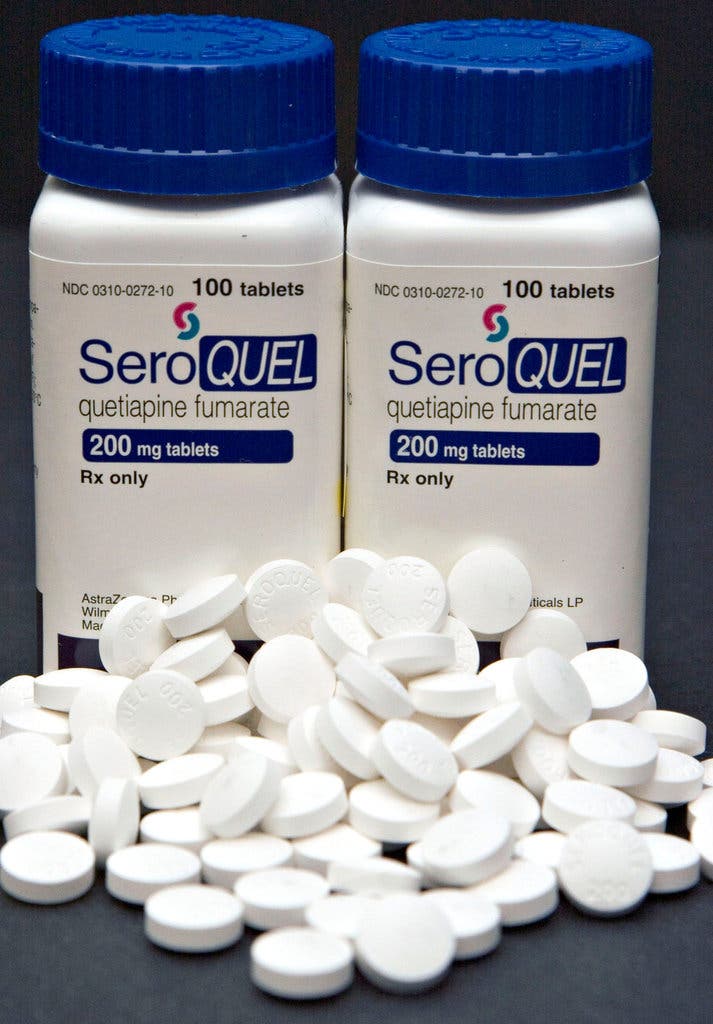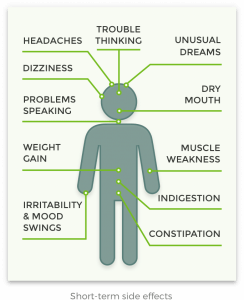This information sheet provides an overview of quetiapine (seroquel), including what it is used for, how it works, possible side effects and safety concerns, and how to take quetiapine safely.
Contents
Understanding Quetiapine (Seroquel)

Quetiapine is a prescription drug helpful to treat schizophrenia, bipolar disorder, and depression. It belongs to a group of drugs called atypical antipsychotics. Quetiapine works by changing the actions of chemicals in the brain.
As a result, it may help you think more clearly, feel less nervous, and take part in everyday life. It may also improve your mood, sleep, appetite, and energy level as well as decrease hallucinations (hearing/seeing things that are not real).
Background

Antipsychotic drugs are normally prescribed by psychiatrists and certain other physicians who specialize in the diagnosis and treatment of mental disorders, such as schizophrenia. These drugs are also used to control severe behavioral problems in patients with Alzheimer’s disease and other forms of dementia.
Quetiapine (Seroquel) is an atypical antipsychotic drug that is FDA-approved for the treatment of bipolar disorder and schizophrenia. It is also approved for the treatment of acute manic episodes associated with bipolar disorder.
Quetiapine can be used in combination with lithium or valproate to treat acute manic or mixed episodes in patients with bipolar I disorder, as well as maintenance treatment of bipolar I disorder (to delay the recurrence of mood episodes).
Quetiapine is used to treat schizophrenia in adults and children who are at least 13 years old. It is also approved for use as adjunctive therapy (treatment added to the primary treatment) for major depressive disorder in adults.
Quetiapine extended-release tablets (Seroquel XR) are FDA-approved for use as monotherapy (treatment by itself) for the acute treatment of depressive episodes associated with bipolar disorder and schizophrenia in adults.
Important Information I Should Know About Quetiapine (Seroquel)
Before taking quetiapine, tell your healthcare provider if you have or have ever had:
- Heart disease, including a heart attack, irregular heartbeat, or slow heartbeat
- High blood pressure
- Seizures
- Diabetes
- Liver or kidney problems
- Low white blood cell count (which can be a sign of a weakened immune system)
- Problems with urination
- Prostate cancer or male breast cancer
- Mental illness (such as bipolar disorder, schizophrenia, depression) or suicidal thoughts or actions
- Any other medical conditions
NOTE: Tell your healthcare provider if you are pregnant, breastfeeding, or planning to become pregnant. Quetiapine may harm your unborn baby. Talk to your healthcare provider about the risks and benefits of using quetiapine during pregnancy. Furthermore, quetiapine passes into breast milk and may harm a breastfeeding infant. Do not breastfeed while taking quetiapine without talking to your healthcare provider first.
Things Should I Discuss With My Doctor Before Taking Quetiapine (Seroquel)
Your healthcare provider will likely want to do a physical exam and some blood tests before prescribing quetiapine. Tell your healthcare provider about all of the medicines you take, including prescription and over-the-counter medicines, vitamins, and herbal supplements. As Quetiapine may interact with other medications, increasing or decreasing their effects.
Administering Quetiapine (Seroquel)

Quetiapine is available as a tablet, an extended-release (long-acting) tablet, or as an oral liquid (solution).
Quetiapine comes in three different strengths:
- 25 mg tablets,
- 300 mg extended-release tablets,
- and 400 mg extended-release tablets.
Your healthcare provider will decide which strength is right for you and may change your dose during treatment to find the best dose for you.
How Should I Take Quetiapine
It is usually taken once or twice daily with or without food. You can take quetiapine at any time of day, as long as you take it at the same time every day. Also, take quetiapine exactly as prescribed by your healthcare provider. Do not stop taking quetiapine without talking to your healthcare provider first. Even if you feel better. If you stop taking quetiapine too soon, your symptoms may return.
Time It Takes For Quetiapine To Work
How long it takes quetiapine to work may vary. Some people may start to feel better within a few days, but others may take up to several weeks.
What Happens If I Miss A Dose Of Quetiapine
If you miss a dose of quetiapine, take it as soon as you remember. However, if it is almost time for your next dose (within four hours), do not take the missed dose. Just skip it and continue with your regular schedule. Do not take two doses of quetiapine at the same time.
What Happens If I Overdose With Quetiapine
If you overdose on quetiapine, call your healthcare provider or local poison control center right away. Furthermore, if the victim has collapsed, had a seizure, has trouble breathing, or can’t be awakened (coma), call 911.
Precautions
Quetiapine can make you drowsy and affect your breathing.
- So don’t drive or operate heavy machinery until you know how the drug will affect you.
- Don’t drink alcohol while taking quetiapine, because it can increase your risk of side effects.
Evaluating Quetiapine (Seroquel)
 Common side effects
Common side effects
- Drowsiness (feeling sleepy)
- Dizziness
- Increased appetite
- Weight gain
- Blurred vision
- Weakness
- Irritability
- Tremors (shaking)
- Nausea
- Vomiting
- Stomach pain
- Heartburn
- Muscle spasm or stiffness
- Sore throat
- Runny nose
- Sneezing cough
- Increased saliva
- Sweating
- Unusual dreams
- Anxiety
- Agitation
- Restlessness
- Headache
Rare/serious side effects
- Low blood pressure when you stand up too quickly; may make you feel dizzy.
- Fast or irregular heartbeat (palpitations)
Risks For Taking Quetiapine (Seroquel) For Long Periods Of Time
You should not take quetiapine if you have:
- Severe heart problems
- Untreated or uncontrolled high blood pressure
- A history of a stroke or mini-stroke (TIA)
- Liver disease
- Kidney disease
- A thyroid disorder
- An enlarged prostate and urination problems
- A history of seizures or epilepsy.
Quetiapine can increase your risk for a potentially life-threatening condition called neuroleptic malignant syndrome (NMS). Symptoms of NMS include:
- High fever (over 102 degrees Fahrenheit);
- Extremely stiff muscles;
- Confusion;
- Sweating or
- Increased heart rate.
If you experience any of these symptoms, call your healthcare provider immediately.
Other Risks
Tardive dyskinesia (TD)
Quetiapine may cause a potentially life-threatening condition called tardive dyskinesia (TD). TD is a disorder that causes unusual and often repetitive movements that you cannot control. If you experience these symptoms, call your healthcare provider immediately.
High Blood Sugar Levels
Quetiapine may increase your risk for high blood sugar levels (hyperglycemia) and diabetes. Quetiapine can also cause changes in the way your body uses sugar, which can lead to weight gain or loss of control of blood sugar levels.
People with diabetes may experience a worsening of their blood sugar levels, and people who do not have diabetes may develop high blood sugar levels or even develop diabetes.
NOTE: Talk to your healthcare provider about any side effects that you have. These are not all the possible side effects of quetiapine. For more information, ask your healthcare provider or pharmacist.
Other Medications That May Interact With Quetiapine (Seroquel)

It is important to tell your healthcare provider about all other medications you use, including vitamins and herbs. Do not stop using any medications without first talking to your doctor.
Medications may interact with quetiapine in many ways:
- Increase the risk of side effects;
- Decrease or increase the effects of one or both medications; or
- Make the medications less effective.
Quetiapine may interact with the following medications:
- Antidepressants such as amitriptyline, fluoxetine, paroxetine, and sertraline
- Opioid pain medications such as morphine and oxycodone
- Blood pressure medications such as atenolol, metoprolol, and nadolol
- Medications used to treat seizures such as carbamazepine, phenobarbital, and phenytoin
- Corticosteroids such as dexamethasone and prednisone.
NOTE: This list is not complete. Other medications can affect quetiapine, so talk with your healthcare provider or pharmacist if you are taking any other medications.
Alternatives To Quetiapine (Seroquel)
If you are having side effects from quetiapine or if it is not working well for you, your healthcare provider may suggest that you try another medication. Furthermore, there are many medications available to treat schizophrenia and bipolar disorder. However, some of these include:
- Aripiprazole (Abilify)
- Clozapine (Clozaril)
- Lithium (Lithobid)
- Olanzapine (Zyprexa)
- Ziprasidone (Geodon)
NOTE: This list is not complete. Other medications are effective to treat these conditions, so talk with your healthcare provider or pharmacist if you have questions about other medication options.
Summary Of FDA Black Box Warnings
The Food and Drug Administration (FDA) is the federal agency responsible for approving medications, devices, and biological agents. A black box warning is the strictest warning that can be placed on a medication by the FDA to help ensure it will only be used when necessary and as prescribed. These warnings are based on studies of the medication and are not meant to scare people away from taking them.
Quetiapine (Seroquel) comes with the following black box warnings:
- Suicidal thoughts or behaviors;
- Increased mortality in elderly patients with dementia-related psychosis; and
- Hyperglycemia and diabetes.
NOTE: For a complete list of possible risks, see “Risks Of Taking Quetiapine” above.
FDA Drug Safety Communication
Antipsychotic drug labels updated to include strengthened warnings about the risk of death in elderly patients with dementia-related psychosis.
The U.S. Food and Drug Administration (FDA) is informing the public that the labels of all antipsychotic drugs have been updated to include strengthened warnings about the risk of death in elderly patients with dementia-related psychosis.
The new Boxed Warning, or Warnings and Precautions section, also informs healthcare professionals that a greater percentage of patients treated with these drugs experienced cerebrovascular adverse reactions (eg, stroke, transient ischemic attack).
The FDA recommends that healthcare professionals should avoid prescribing antipsychotic medications for dementia-related psychosis due to the potential risks. If treatment is necessary, the FDA suggests using atypical antipsychotics at the lowest possible dose for the shortest amount of time.
The FDA is also requiring manufacturers to develop a medication guide that advises patients and caregivers about these risks, in addition to providing information on how to safely stop taking the drug.
DISCLAIMER: The information provided on this website is for informational purposes only. Therefore, it should not be used in place of the advice of your physician or qualified healthcare provider.
Experts’ Opinion On Quetiapine (Seroquel)
There has been a lot of controversy surrounding Quetiapine (Seroquel) in recent years. Most recently, the FDA updated its label to include new safety information about increased deaths when used for dementia-related psychosis.
Furthermore, some experts believe that this medication is not safe or effective and professionals should avoid prescribing it in most cases. However, other experts say that it can be a safe and effective medication when used correctly.
NOTE: It is important to talk with your healthcare provider about the risks and benefits of quetiapine before deciding if it is the right medication for you.
Case Study
A 21-year-old college student, who had been diagnosed with depression four years before, was prescribed Quetiapine (Seroquel). Although she had never tried any other substance besides marijuana and alcohol. However, her friends reported that they found cocaine at a party in her apartment. The patient’s roommate confirmed that the cocaine belonged to the patient and that she had used it recently. Therefore, the patient was treated in the emergency department and then transferred to a psychiatric unit.
Conclusion
Quetiapine (Seroquel) is a medication that comes with some serious risks. Thus, it is important to talk with your healthcare provider about the risks and benefits of quetiapine before deciding if it is the right medication for you. Remember, there are many other medications available to treat schizophrenia and bipolar disorder. So don’t feel like you have to stay on quetiapine if you don’t feel comfortable with it.
A Word From Therapy Mantra
Your mental health — Your psychological, emotional, and social well-being — has an impact on every aspect of your life. Positive mental health essentially allows you to effectively deal with life’s everyday challenges.
At TherapyMantra, we have a team of therapists who provide affordable online therapy to assist you with issues such as depression, anxiety, stress, workplace Issues, addiction, relationship, OCD, LGBTQ, and PTSD. You can book a free therapy or download our free Android or iOS app.

 Common side effects
Common side effects
